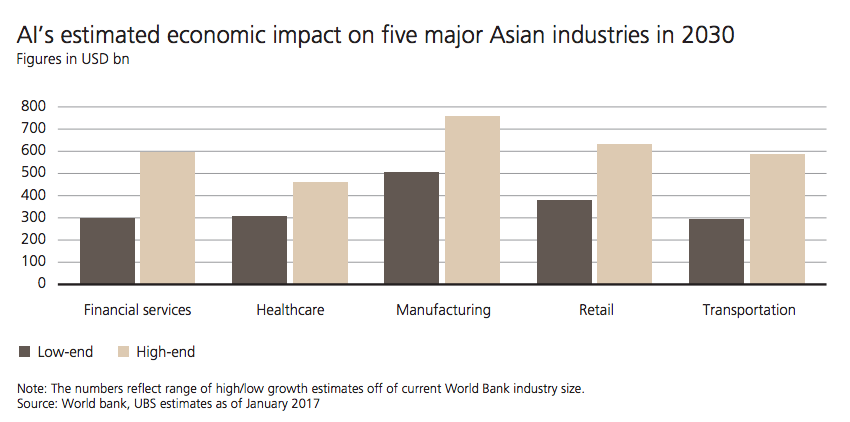By 2030, artificial intelligence will be “as commonplace in society as Internet-ready devices are today,” according to UBS. In the field, Asia has the potential to become a global leader, the Swiss banking giant claims.
In the region, AI could produce economic value between US$1.8 to 3 trillion a year by 2030 in the region, according to UBS CIO’s estimates. In particular, AI is expected to have a significant impact on the industries of financial services, healthcare, manufacturing, retail and transportation – sectors that currently contribute to about two-third of Asia’s GDP.

Already, several players in China including Baidu, Alibaba and Tencent have jumped into the AI race.
Baidu is in partnership with the government to build the country’s first national AI research laboratory in Beijing. Alibaba is working with AI-powered solutions to tackle healthcare issues in China and globally, and launched in July a low-cost voice assistant speaker, similar to Amazon’s Echo. Tencent introduced its voice assistance Xiaowei in June.
Meanwhile smaller Asian startups, notably in India and Japan, are making significant progresses in the field. Japanese insurance firm Fukoku Mutual Life Insurance has already made 34 employees redundant, replacing them with IBM’s Watson Explorer AI. In India, Netradyne has developed a powerful camera that analyzes driving patterns and help determine the cause of an accident. Bengaluru-based Embibe offers an AI product that aims to transform the world of education.
 In a report titled “How Artificial Intelligence Will Transform Asia,” UBS cites the main strengths of Asia is its vast and emerging talent pool, a freedom from legacy assets and the massive amount of data that is being collected across the region.
In a report titled “How Artificial Intelligence Will Transform Asia,” UBS cites the main strengths of Asia is its vast and emerging talent pool, a freedom from legacy assets and the massive amount of data that is being collected across the region.
“Thanks to its demographics, Asia is in an enviable position despite its late entry into the AI industry,” the report says.
“On the demand side, we see strong demand for homegrown AI talent, as technologies like speech recognition become a differentiating factor. While on the supply side, we believe universities will offer more courses on data sciences, machine learning, etc. to further fine-tune and redirect the region’s vast engineering talent towards AI.”
In an interview with CNBC, UBS’s global IT analyst, Sundeep Gantori, said that despite the US’ head start, Asia will end up having more AI talent than America by 2025.
“By 2025, we think that the talent in India and China together will exceed what we’ll have in the US,” he said. “At the same time, the region generates a lot of data, which is very handy in AI.”
Challenges to overcome
AI, an umbrella term for many technologies including cognitive computing and machine learning, has the potential to benefit businesses through cost savings due to the high scalability, an elimination of both omission and commission errors, and the ability to instantaneously document and optimize processes.
Yet, in order for Asia to become a leader in the field, several challenges need to be overcome. In particular, the region still faces an uphill path due to the lack of an AI-based ecosystem, in addition to Asia’s relatively late entrance into the industry.
Moreover, the potential disruption to long-entrenched business models and the risks of job losses in traditional industries and may dissuade some markets from pursuing an AI-ready future.
UBS estimates that 30 to 50 million jobs in Asia are at risk in the medium to long term. At the same time, AI should also create many new categories of jobs, ranging in the millions.
The firm advises the Asian public and private sectors to start embrace AI to provide the optimal setting for talent and innovation to thrive.
It concludes:
“Government should start to focus more on occupations that require a high level of personalization, creativity and craftsmanship as these jobs will be less affected by AI. Regulators also need to step up their efforts by seeking cooperation regionally and also by striking a balance between promoting the adoption of AI and managing the downside risks.”
Featured image: Cyborg by Ociacia, via Shutterstock.com.









